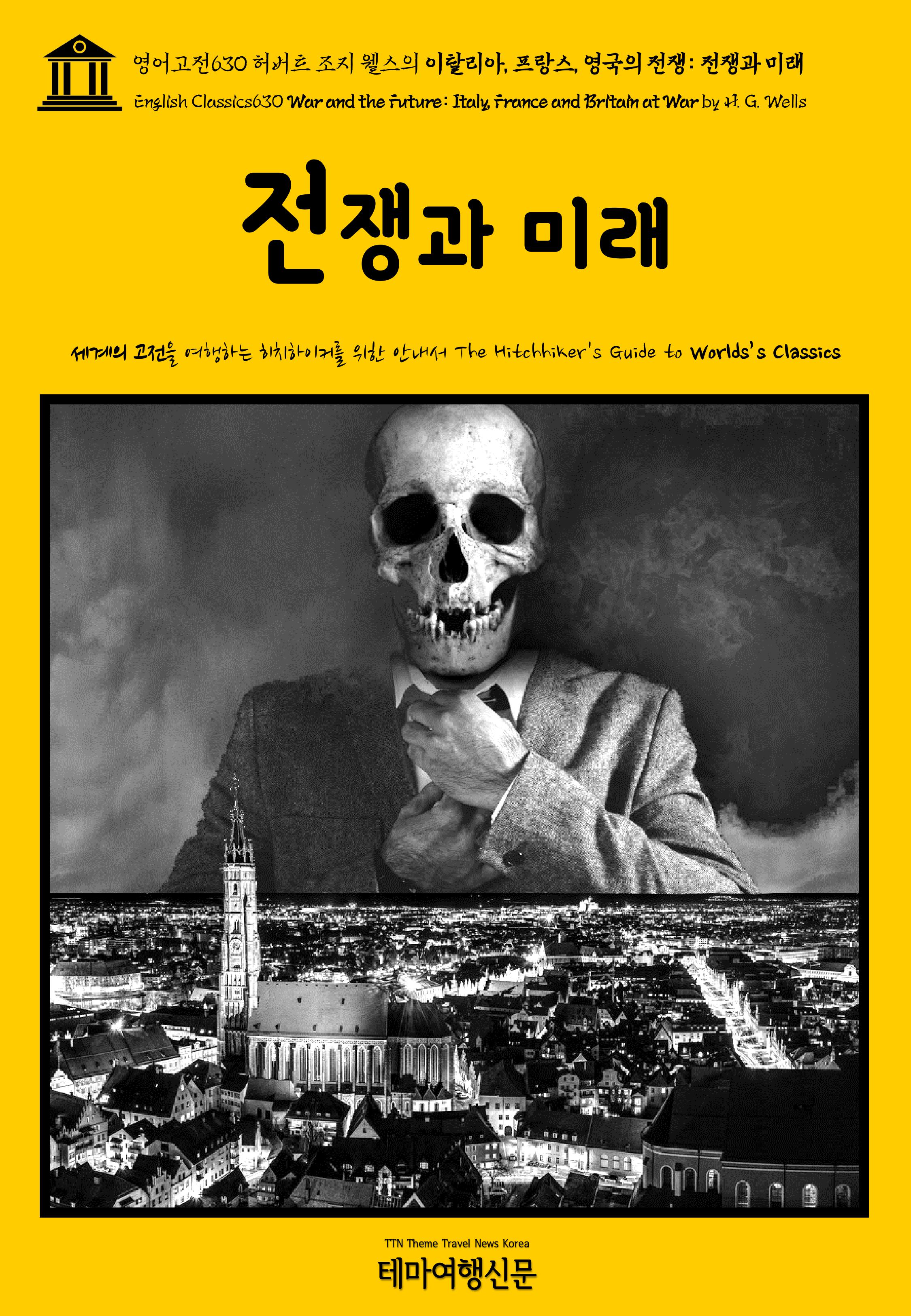▶ 전쟁과 미래(War and the Future: Italy, France and Britain at War by H. G. Wells)(1917)는 허버트 조지 웰스(H. G. Wells)(1866~1946)의 전쟁 선전 작품(a work of war propaganda)으로 부제는 이탈리아, 프랑스, 영국의 전쟁(Italy, France and Britain at War)입니다. 연재에 앞서 1916년 8월 8일부터 프랑스 수아송(Soissons)을 시작으로 이탈리아 베니스(Venice), 우디네(Udine), 베로나(Verona), 밀라노(Milan)를 거쳐 다시 프랑스의 아라스(Arras), 돔피에르(Dompierre), 프리쿠르(Fricourt), 알베르(Albert) 등 전선(戰線)을 두루 취재하였습니다.
서두의 이탈리아 전쟁(The War in Italy)을 시작으로 프랑스의 서부전쟁(The Western War), 미래에 대한 예측(How People Think About The War) 등의 순으로 연재하였으며, 1917년 단행본으로 출간하였습니다. 자신은 평화주의자(I avow myself an extreme Pacifist)란 주장과 독일의 만행을 막기 위한 영국의 전쟁이 정당함을 주장하는 메시지는 상호 모순됩니다만, 당대의 유럽 독자들에게는 호평 받았습니다. 테마여행신문 TTN Korea 영어고전(English Classics)과 함께 어제도, 오늘도, 내일도 멋진 문학여행을! B
▶ THE PASSING OF THE EFFIGY. One of the minor peculiarities of this unprecedented war is the Tour of the Front. After some months of suppressed information?in which even the war correspondent was discouraged to the point of elimination?it was discovered on both sides that this was a struggle in which Opinion was playing a larger and more important part than it had ever done before.
동상의 통과. 이 전례 없는 전쟁의 사소한 특징 중 하나는 전선의 순회(Tour of the Front)입니다. 종군기자조차 제거할 지경까지 낙담한 정보가 몇 달 동안 은폐된 후 양측에서 이것이 여론이 그 어느 때보다 더 크고 중요한 역할을 하고 있는 투쟁이라는 사실이 밝혀졌습니다.
▶ THE WESTERN WAR (SEPTEMBER, 1916). If I had to present some particular scene as typical of the peculiar vileness and mischief wrought by this modern warfare that Germany has elaborated and thrust upon the world, I do not think I should choose as my instance any of those great architectural wrecks that seem most to impress contemporary writers. I have seen the injuries and ruins of the cathedrals at Arras and Soissons and the wreckage of the great church at Saint Eloi, I have visited the Hotel de Ville at Arras and seen photographs of the present state of the Cloth Hall at Ypres?a building I knew very well indeed in its days of pride?and I have not been very deeply moved. I suppose that one is a little accustomed to Gothic ruins, and that there is always something monumental about old buildings; it is only a question of degree whether they are more or less tumble-down.
서부 전쟁(1916년 9월). 독일이 정교하게 만들고 세계를 강타한 이 현대 전쟁이 초래한 기이한 사악함과 장난의 전형으로 어떤 특정한 장면을 제시해야 한다면, 나는 가장 많이 보이는 그 위대한 건축적 잔해를 내 예로 선택해야 한다고 생각하지 않습니다. 현대 작가들에게 깊은 인상을 남기기 위해 나는 아라스(Arras)와 수아송(Soissons)의 대성당의 부상과 폐허와 세인트 엘로이(Saint Eloi)의 큰 교회의 잔해를 보았고 아라스의 호텔 드 빌레(Hotel de Ville)을 방문했으며 이프르(Ypres)의 클로쓰 홀(Cloth Hal)l의 현재 상태 사진을 보았습니다. 나는 그 교만의 시대를 참으로 잘 알고 있었고 그다지 크게 감동하지 않았습니다. 고딕 양식의 폐허에 조금 익숙해지고 오래된 건물에는 항상 기념비적인 것이 있다고 생각합니다. 그들이 어느 정도 하락했는지 여부는 정도의 문제일 뿐입니다.
▶ HOW PEOPLE THINK ABOUT THE WAR. All human affairs are mental affairs; the bright ideas of to-day are the realities of to-morrow. The real history of mankind is the history of how ideas have arisen, how they have taken possession of men's minds, how they have struggled, altered, proliferated, decayed. There is nothing in this war at all but a conflict of ideas, traditions, and mental habits. The German Will clothed in conceptions of aggression and fortified by cynical falsehood, struggles against the fundamental sanity of the German mind and the confused protest of mankind. So that the most permanently important thing in the tragic process of this war is the change of opinion that is going on. What are people making of it? Is it producing any great common understandings, any fruitful unanimities?
사람들이 전쟁에 대해 어떻게 생각하는가. 인간의 모든 일은 정신적인 일입니다. 오늘의 밝은 생각이 내일의 현실입니다. 인류의 진정한 역사는 사상이 어떻게 생겨났는지, 사상이 어떻게 인간의 마음을 사로잡았는지, 어떻게 투쟁하고, 변화하고, 증식하고, 쇠퇴해 왔는지에 대한 역사입니다. 이 전쟁에는 사상, 전통, 정신적 습관의 충돌 외에는 아무 것도 없습니다. 냉소적인 거짓으로 강화된 침략의 관념으로 무장한 독일 의지는 독일 정신의 근본적인 정신에 대항하는 투쟁과 인류의 혼란스러운 항의에 맞서 싸웁니다. 그래서 이 전쟁의 비극적인 과정에서 가장 영구적으로 중요한 것은 현재 진행 중인 의견의 변화입니다. 사람들은 그것을 무엇으로 만들고 있습니까? 그것은 어떤 위대한 공통된 이해, 어떤 유익한 만장일치를 생산하고 있습니까?
▶ THE ENDING OF THE WAR. About the end of the war there are two chief ways of thinking, there is a simpler sort of mind which desires merely a date, and a more complex kind which wants particulars. To the former class belong most of the men out at the front. They are so bored by this war that they would welcome any peace that did not definitely admit defeat?and examine the particulars later. The “tone” of the German army, to judge by its captured letters, is even lower. It would welcome peace in any form. Never in the whole history of the world has a war been so universally unpopular as this war.
전쟁의 끝. 전쟁이 끝날 무렵에는 두 가지 주요 사고방식이 있습니다. 단순한 날짜를 원하는 단순한 종류의 마음과 세부 사항을 원하는 보다 복잡한 종류의 마음이 있습니다. 전자 계급에 속하는 대부분의 남성은 최전선에 있습니다. 그들은 이 전쟁이 너무 지루해서 패배를 인정하지 않는 평화라면 무엇이든 환영하고 나중에 세부 사항을 검토할 것입니다. 캡처된 문자로 판단할 수 있는 독일군의 "음조"는 훨씬 낮습니다. 그것은 어떤 형태로든 평화를 환영할 것입니다. 세계 역사상 이 전쟁만큼 보편적으로 인기가 없는 전쟁은 없었습니다.






